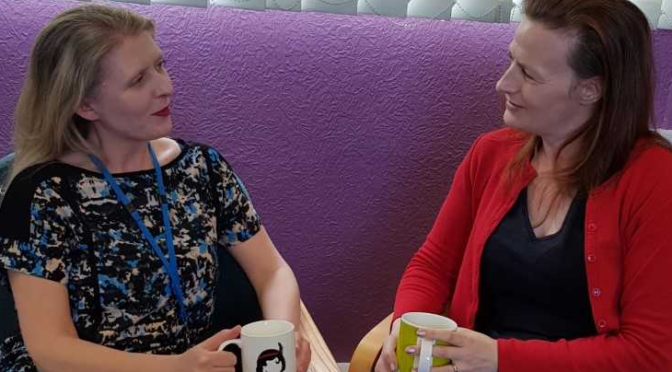Posted By: Amy Tubb
30th May 2018
3 minute read

Claire Marshall (pictured left) and Jane Matfin are specialist nurses working in the Hull and East Riding Perinatal Mental Health Liaison Service..
The service supports women with pre-existing or newly emerged mental health problems within the perinatal period. The birth rate for women in this area is approximately 6,500 per year. The team consists of nurses, a consultant psychiatrist, therapist and support workers who all work collaboratively with GPs, midwives, health visitors and social workers.
Claire and Jane have worked in mental health for over 20 years and moved into perinatal care after working in inpatient units, emergency mental health services and leading/managing teams in these areas. Here they talk about the challenges and rewards of being part of a perinatal mental health team.
What made you decide to move from working in crisis mental health care to the perinatal team?
Jane: I felt that I wanted to move from crisis mental health care after many years in that area, where interventions are often short-term with a high turnover of patients. I already knew the staff in the perinatal team and had good working relationships. I valued the opportunity of working in a smaller team with a clearly defined patient group. I feel strongly about women’s place in society and their mental health, and the changes and effects that motherhood can have on their lives.
Did motherhood influence your decision to work in the perinatal team?
Claire: I’ve always been interested in perinatal mental health, but it was no coincidence that not long after having my second child I jumped at the opportunity to be part of a newly emerging service.
Being a relatively new mum highlighted how amazing motherhood is but also the terrific challenges it brings.
What might an average day involve for you?
Jane: Each day is very different but, for example, tomorrow I will be meeting a woman for the first time to assess her mental health and to see what help she needs (a pregnant woman with a history of severe anxiety). Later, I will meet a woman to formulate a mental health birth plan and then I have a home visit to see a young woman with long-standing psychological problems in the hope that I can encourage her to engage with services.
What do you think are our main challenges when we are trying to build relationships with women?
Claire: We’ve come a long way in changing people’s understanding of mental health problems but there’s still work to be done. From conversations it’s clear that, stigma exists which prevents women from asking for help. Fear that their parenting may be questioned, prevents them from reaching out. They worry that their babies might be taken away when., in reality, this is highly unlikely for the majority of women.
In your time in the perinatal team what has been your greatest reward?
Jane: The opportunity to build strong therapeutic relationships with women. I consider it a privilege to be part of a family’s life at such an important time. Feedback that I have made a difference is a huge reward. Many of the women we care for have had poor experiences due to their mental health, but it is fantastic that, with the support of our team and other colleagues, they can go on to have a better experience, stay well and be supported.
What are your hopes for the future of our service?
Claire: I’m looking forward to continuing and developing the educational part of what we do - teaching other professionals about the importance of good perinatal mental health. We’re excited that our patients are helping us develop our clinical pathways.. We’re hoping to secure training for the team around infant mental health, which would broaden our knowledge base. We have a great collaboration with the University of Hull in education and research and I’m really excited about the future in this area of care.
Humber Teaching NHS Foundation Trust’s mission is to be a multi-specialty health and social care teaching provider. They provide specialist, mental health and primary care, community, children’s and learning disability services to more than 700,000 people in Hull, the East Riding of Yorkshire, Scarborough and Ryedale, and Whitby.